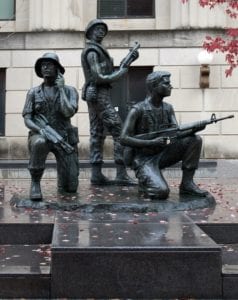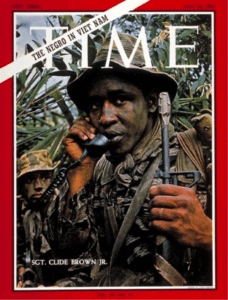Don’t we each wish we had a record of family stories that are now lost? The memories of a grandmother, an aunt, a brother or a cousin. Thousands of Vietnam veterans in the Memphis area possess stories that need to be told and preserved. Will you help us locate those veterans?

You don’t have to walk very far in the corridors of the VA Medical Center in Memphis to realize that you are among veterans who are proud of their service. Many of them wear ball caps proclaiming when and where they served; Korea, Vietnam. Sometimes, still, World War II. In the Army Infantry or Airborne, during through Operation Desert Storm or Enduring Freedom, or on board a ship. Other caps simply bear the words Semper Fi.
Many of the veterans at our VA are African American. And many, if not most, are Vietnam Veterans. In their seventies now, some are being treated for the residual effects of old wounds or illnesses related to time served in America’s most controversial and, at the time, longest war.
How do they feel today about having fought in a war that divided a nation? How do African American veterans reconcile fighting for a country that made promises it didn’t keep in a war that sidetracked progress in civil rights. These veterans have stories to tell that have been sharpened by time

Since 2017, I’ve been the host and producer of “Vietnam 360,” an interview show airing on The Library Channel (WYPL) in Memphis. With “Vietnam 360” we are trying to get Vietnam veterans to sit down in front of the cameras and recall the events of fifty years ago.
Some of the stories are terrifying, many are poignant. All are real. This is not the Hollywood version of Vietnam. Since we’ve been producing “Vietnam 360,” we’ve heard what it was like to be shot out of the sky and end up in a North Vietnamese POW camp, what it was like in the door of a helicopter flying into fierce combat. A man who is today an Arkansas minister recalled the adrenaline rush of leading Marine patrols through the jungles in search of an invisible enemy.
We’ve met a man who went from clerk to hero in one morning. A woman whose husband disappeared on a night bombing mission relives a startling discovery that happened a half century later. Another veteran talks about the shock of hearing that Dr. King had been murdered in his hometown.
Many of the veterans, black and white, talk about what it was like, for the first time, to share everything with men they had been brought up to hate or fear.
From the first episode, we’ve known it was essential with “Vietnam360” that we hear the voices of black veterans. The struggles many of them faced before, during and after the war are the stories everyone needs to hear.

In the 1960s many black men went into the military because it offered opportunity and training that often wasn’t available or affordable in civilian life. During the Vietnam War (1955-1975) America had the first fully integrated wartime military in our history. But the military wasn’t isolated from the problems common in civilian society.
Many African Americans, whether they were drafted or volunteered, were denied technical training and were assigned instead to infantry units where the casualty rates were highest. As a result the number of black soldiers and marines who were killed and wounded was disproportionate to the population, especially in the early years of the war.
In 1965, for example, eleven percent of Americans were black, yet (according to numbers gathered by PBS) African Americans represented twenty five percent of those killed in action. Civil Rights leaders, including Dr. Martin Luther King Jr. protested the disparity directly to President Johnson and things did eventually change.
While Dr. King eventually spoke out against the war, many in the civil rights movement blamed the war and the protests against it for diverting attention and resources from the struggle for African American equality.
2.7 million Americans served in what some have referred to as a “working class war,” fought by blue collar whites, African Americans and Hispanics. Many didn’t have the means to get a college deferment. And often we came from families where to serve was expected when our country called.
Twenty African Americans received the nation’s highest award, the Medal of Honor. More than seven thousand African Americans were killed in action in Vietnam. Many thousands more were wounded. Others carry invisible scars.
Many Vietnam veterans returned home with new skills and maturity and most went on with their lives. But despite the promise of progress, black veterans found life in peacetime much the same as when they left. Some struggled with alcoholism and addiction and with a legal system weighted against them.
In Vietnam, extraordinary friendships were made; tragedies were shared. Yet many veterans came back from Vietnam and seldom talked about what happened to them during the war. If you are a Vietnam Vet and are willing to tell your story, please contact me.
If you know someone; a father, a mother, an uncle, brother or neighbor who served, please ask them to contact me. Asking them to tell their story so that it will be available to future generations may be the best way to thank them for their service.
(George Larrimore served in the U.S. Marine Corps in Vietnam (1967-68). He can be reached at Vietnamwar360@gmail.com.)




